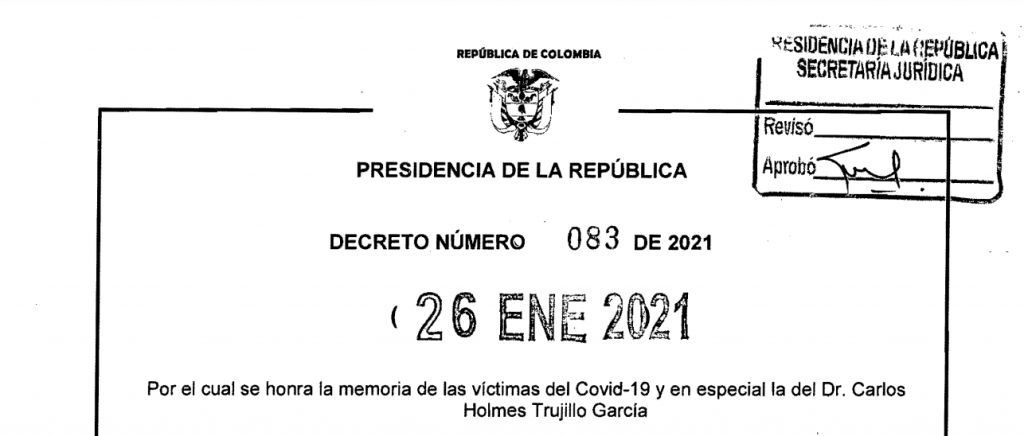In Colombia, an official call to mourn the country’s growing number of COVID-19 victims came alongside the news of defense minister Carlos Holmes Trujillo’s death due to the virus. Within the same day, on January 26th, Colombian President Iván Duque issued an executive decree calling for the “honoring of the memory of COVID-19 victims and especially that of Dr. Carlos Holmes Trujillo García” via a three-day period of national mourning. Duque used rhetoric surrounding this symbolic act to describe COVID-19 as the “invisible enemy” that Trujillo faced while in the “line of duty,” relegating the disease to a collective threat similar to the lingering conflict violence that Duque’s administration has been ill-equipped to manage.

Duque’s strategic fanfare of national mourning came amid ongoing political and infrastructural battles in containing COVID-19 throughout Colombia and the unexpectedly slow march toward vaccine procurement and distribution in one of the wealthiest countries in South America. An official Facebook post announcing the days of mourning garnered outraged comments from the public who demanded more accountability from Duque’s administration. One individual condemned the president specifically, saying, “A leader knows how to anticipate what is to come, but you didn’t do that, so here we are today mourning.” In this public reaction, the charade of presidential mourning for a tragedy that demands (ongoing) governmental intervention and accountability was called out as a paradoxical measure.
In an almost split-screen occasion, exactly one week prior to Colombia’s state-mandated mourning, U.S. President-Elect Joe Biden led a night of mourning and commemoration for the nearly half a million American lives lost to COVID-19. The ceremony featured visually stunning lights running the length of the Lincoln Memorial Reflecting Pool in D.C. and a musical performance from a nurse serving on the “frontlines” of the battle against COVID-19.
In Biden’s case, this calm and dignified occasion on the eve of his inauguration stood in stark contrast to the chaotic optics of Trump’s exit from office and the former administration’s fierce denialism toward COVID-19’s harm and destruction. The ceremony was an opportunity to dramatize the passage to a new administration that is both haunted by yet still immediately in the throes of a deadly pandemic. The New York Times declared that Biden had “assumed the role of mourner in chief,” which interestingly preceded and loomed over the formal transfer of power that would occur the following day on the Capitol steps.
In both cases, national governments deliberately incorporated mourning into a political agenda still threatened by the urgency of COVID-19 as a mortal, societal, and economic hazard. These vague yet chronologically significant mandates of mourning represent a broader phenomenon I’ve come to reflect on in my research as “meddling commemoration,” or commemoration that is deployed in the middle of a persistent, collective threat.
In sociological understandings of commemoration following polarizing events, the baseline assumption is that commemoration occurs “after the fact.” As far as the timing of state-sanctioned commemoration, it is usually a matter of days, months, years, or decades between the tragic event and the present ceremonial actions. This distance determines the various ways that political actors interpret and mobilize collective memory of the event. What happens, though, when commemoration (and mourning, in this case) coincides with the ongoing unfolding of a singular, slow-moving tragedy like COVID-19?
President Duque’s and President Biden’s commemorative actions at the start of 2021 certainly do map onto real losses in the past, as they emphasize the deaths accrued in the pandemic thus far. But they also overlap with ongoing loss, to which both governments are accountable for putting an end. The complexity of the COVID-19 pandemic is such that natural disaster has intertwined with the failures of political leaders and their corresponding infrastructures in a way that makes it easier for governments to divert blame (at least rhetorically).
The challenge of initiating “meddling commemoration,” then, in the case of a decree or ceremony, is that it must not revert to a diversionary tactic. While mourning and remembrance serve an important function in society, these symbolic actions cannot and should not replace the material crisis management demanded of governments when the “object” of commemoration—in this case, pandemic deaths—extends as a threat to our present and future.
Kristin Foringer is a USIP-Minerva Peace and Security Scholar at the U.S. Institute of Peace and a Ph.D. Candidate in the Department of Sociology at the University of Michigan. Her research focuses on law and culture in post-conflict Colombia, with current work focused specifically on collective memory and symbolic reparations in the country.


Comments